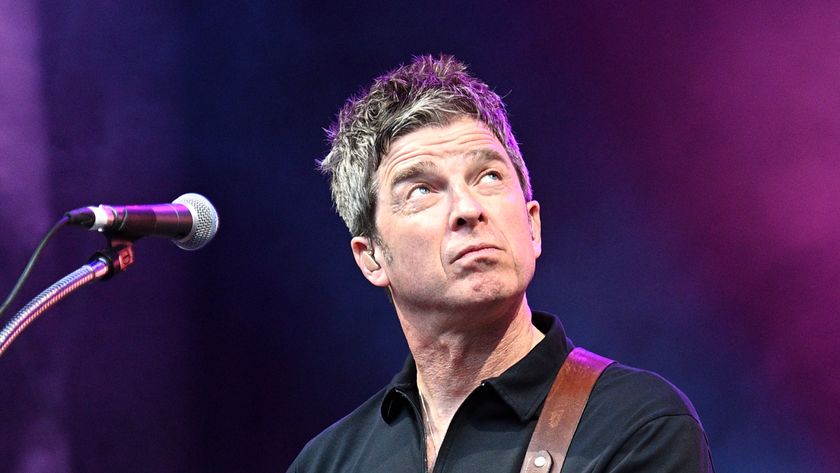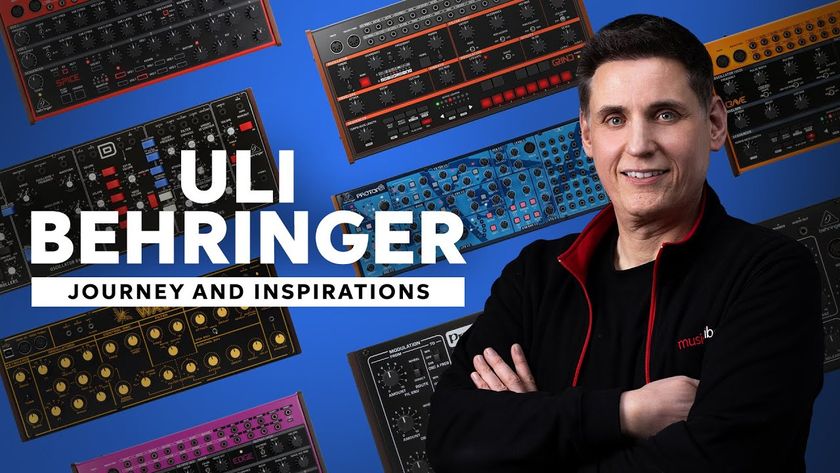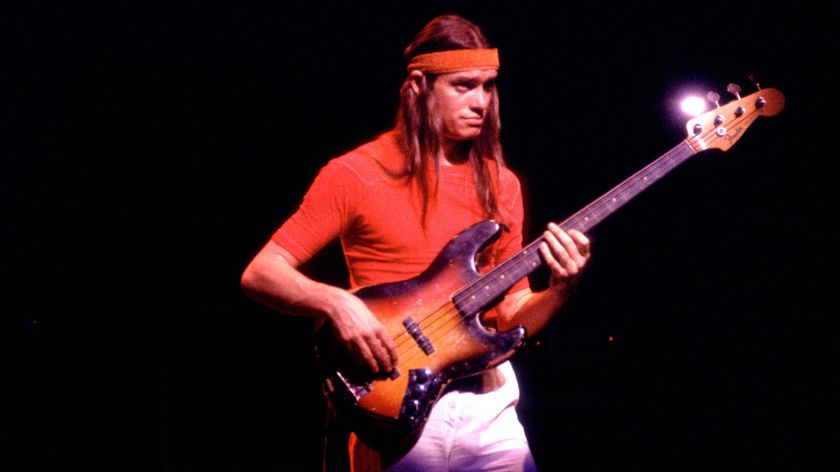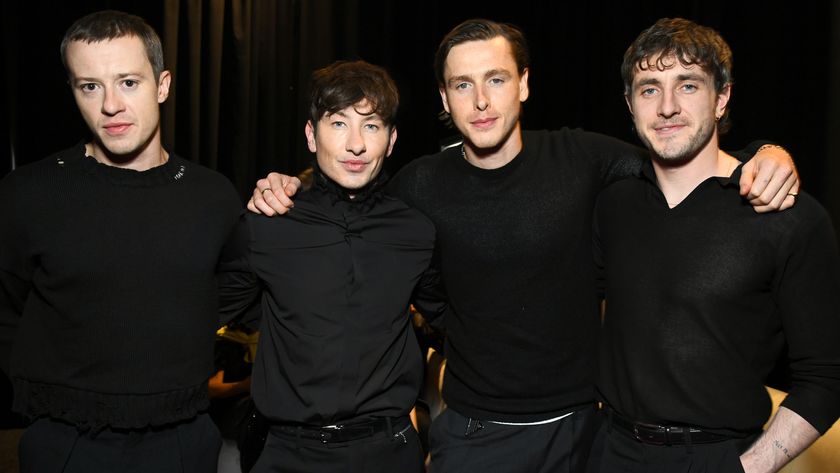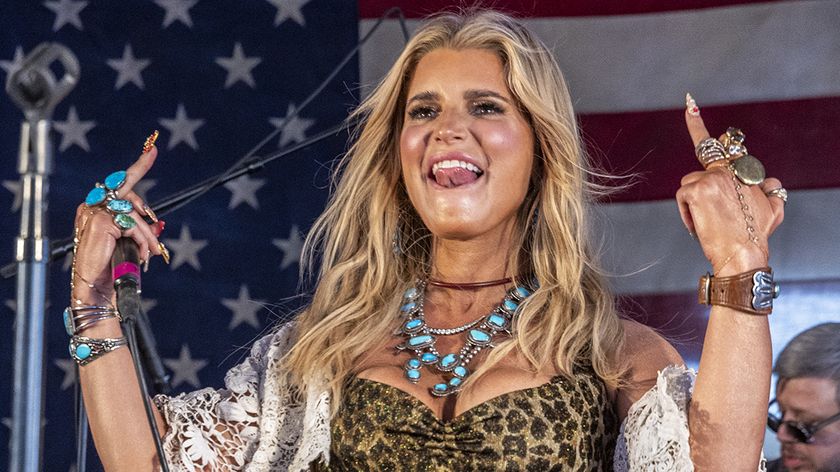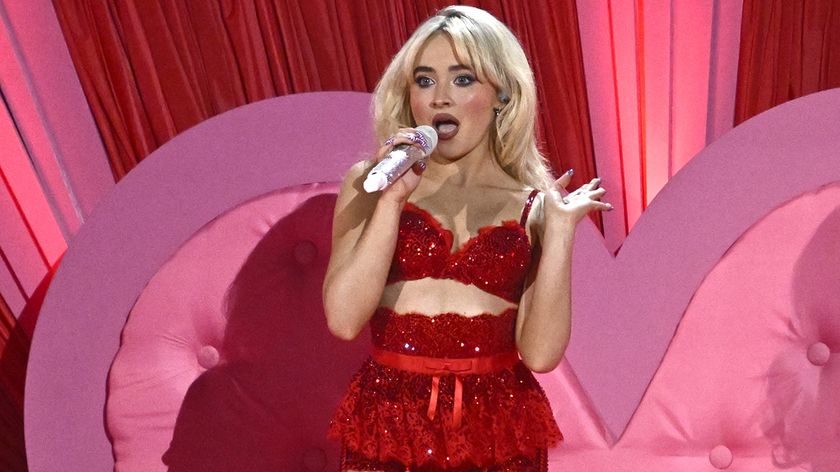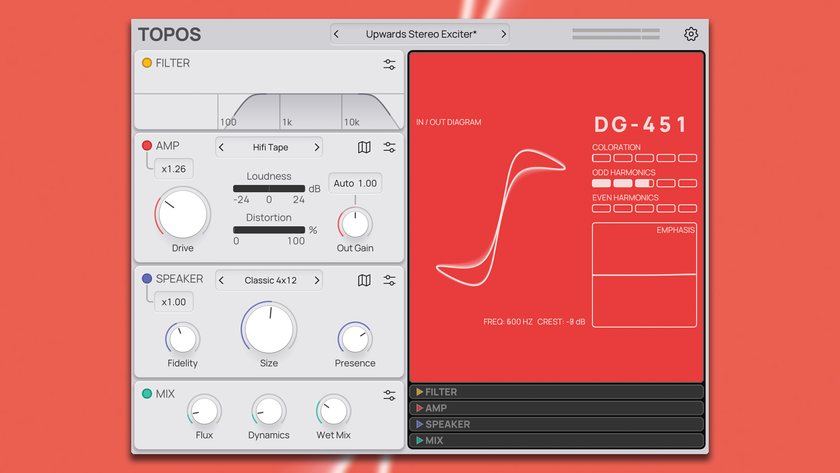Guitarist Uncut: Interview With Anders Nystrom, Katatonia
Katatonia released last year´s most unique and engaging metal release with the Night Is The New Day album - an all-encompassing listening experience perfectly suited to the dark winter days currently falling over the UK. Guitarist met up with founder member Anders 'Blakkheim' Nyström to discuss the making of the album, especially the guitar gear and playing behind it.
Please note:
this interview was conducted before the announced
of guitarist Fredrik Norrman and bassist Mattias Norrman from the band.
You collaborated with a musicians outside the band, keyboard player Frank Default, for this album. It sounds like has had a lot of influence on the sound…
“I think he had a lot of influence. He´s basically been the guy that´s taken care of all the sounds that aren´t a guitar. Of course we always like to experiment with sounds ourselves - that sound like a keyboard but are played on guitars. We like to cross all borders between keyboard and guitars.
Get the MusicRadar Newsletter
Want all the hottest music and gear news, reviews, deals, features and more, direct to your inbox? Sign up here.
“But Frank is just a super talented guy in his field. Jonas [Renkse, vocals] and I are very interested in that, we know how to get some sounds going but we´re not good piano players or anything like that. We actually worked with him before where we gave him the chance to be involved with the remix of a song. We decided that the three of us sit would down and make it a 100 per cent collaboration on this album - that´s what we needed to do in order to top ourselves. We really didn´t want to make a clone of The Great Cold Distance album. We wanted to do something beyond our core song - even though we will always be based on a rock and metal sound. I think it´s very, very interesting to add sounds where you don´t really know what is making them [as a listener] - it can be a guitar or a keyboard but it´s basically a soundscape that creates more depth. I think the collaboration with him made the album so much more three-dimensional.”
It´s almost orchestral…
“Exactly. He had his own Fender Rhodes piano which he brought in. It was really good to hear that. He actually did more on the album than was needed, we didn´t need to ask him to come in and do more. We filtered it so it didn´t become something that wasn´t Katatonia.”
When did he come into the process?
“We gave him the demos pretty early and said, just go and add your stuff and we will filter it through different stages.”

How did that affect the approach of yourself and Fredrik with the guitars? Are you leaving more space in the music than you ever have before?
“Yes I think we were finding the spots that were vacant, so to speak. Filling the sound picture - not overdoing it but finding where the spaces were. There´s really something in the mix of this album where there´s something in every corner. And it´s not just there for the sake of it - it has a value. That´s why I say the production is very three-dimensional - especially when you listen to it through headphones. You will always notice something subtle going on in the background, you might not even know what it is.”
It´s really interesting to hear Jonas´ vocals on this album - he has a lot of room to work in and his melodies have a lot of depth too; he´s never going for the obvious path. It sounds like he´s been given a free reign on this album - was that the case?
“Definitely. First of all, Jonas was the one who wrote most of the songs on this album; so he really stepped up on that part. That was a pleasant surprise. It´s really a case of him maturing even further as a performer and vocalist. It´s natural that more vocal melodies and hooks and lines are going to get more room. It all comes with the confidence growing. That´s a pleasant thing for everybody - that makes it work. Then we´re not stagnant and can always stay ahead.”
Reading the updates on the website earlier in 2009, there was a point when you were pretty honest with fans about suffering from writer´s block. The time you took has often paid off but it must have been frustrating for you…
“There´s no reason for us to hide those facts because that´s the truth. And now we´ve finally overcome the obstacles we´re proud instead. We were so pressured by everything - ourselves as artists knowing we had to top the last album, also finding the motivation to do this. We have a pretty negative outlook on a lot of stuff here in life and when you go through these cycles, which are often the source of inspiration for Katatonia, it can be hard sometimes to even find the motivation to go on.
“We tried [to start work on the album] a couple of times but we didn´t get there. It had worked flawlessly in the past - we´d always set up a date and work towards that, counting on having all the material ready in time for that. It worked perfectly in the past but this time it didn´t and I think it´s because we´ve come to a point where we have to step up a lot more. I don´t know how much further you can take things without having to change. There´s only so far you can go with a certain kind of style before you have to look sideways to get out of there.
“I don´t think that we´ve found ourselves in a dead end here but we needed the motivation to kick ourselves in the ass and find what was there the whole time, waiting for us. I think what really opened things up was that Jonas stepped up and wrote the majority of the album´s material. It showed that nothing is wrong if I don´t do anything, that was interesting.”

You´re undeniably a band that writes albums, as opposed to just collections of songs but even so, this feels like the most cohesive album you´ve ever made. Do you feel that it is a start to finish journey for the listener?
“It is. When people ask me what my favourite song is, it´s the hardest question to answer. How can I pick out just one? We made the whole album and we made a track list order to constitute one listen from start to end and then you should feel something after that. I think affects you a lot more than when you´re just picking out certain songs. I really urge people to dive into this album and give it a chance from start to finish to see what it will do.”
There´s a lot of textural guitar playing from yourself and Fredrik on the album but there´s also the heaviest tones you´ve ever had. What´s changed in terms of your gear and tunings?
“We´re keeping the tuning to C but also dropping the lower E string one step down on a couple of songs. But we managed to dial in this superb crunchy drill-like contemporary guitar sound. It´s not annoying in any way; it´s not too brutal but when we hit certain kinds of notes it sounds massive immediately. We wanted to have this balance because we didn´t want that element of the guitars to stick out too much - they had to be part of the overall package. They really had to be the foundation of the production. But it was so easy to find the sound this time. We´ve got a new endorsement from
in Poland and it literally took us twenty minutes to dial in the sound on this album. It was crazy! In the past we´ve worked for one or two days just trying to find the right tone, always experimenting with different types and mic signals from different cabinets. But this time it was super easy and that was very encouraging.”
Laboga are quite a small company…
“They´re fairly unknown but it´s superb stuff - when we heard them we just said, wow. It was something we were chasing before - you always pick out something you like from every amp you play through but there hadn´t been an amp that could do everything. With this Laboga amp [a Mr Hector Duo Master] it was twenty minutes and there you go - couldn´t be better. It´s an integral part of our new sound now.”
What were your favourite effects to use for this album?
“One of my favourites is a [BOSS SG-1]
Slow Gear
pedal - it´s beautiful and it creates this dream-like keyboard-esque effect. It lands somewhere in the twilight zone between a guitar and a keyboard. Of course I´m a big fan of delay too - I always experiment with it. Analogue delays - even hooking up different delays at the same time with different time signatures - and backwards delays. I´m a real sucker for effects pedals and we just brought in tons of them for this recording. We also used the [Electro-Harmonix chorus]
Small Stone
box too. It´s like a peaceful wall of sound or something - really nice. On the distortion side we kept everything pure - it´s compressed but natural amp distortion.”
Can you pick a favourite delay pedal?
“
Electro-Harmonix Memory Man
- we had that hooked up the whole time. It´s amazing. That´s one I´ll definitely have to put into my rig!”
You used to use a BOSS GT3 unit live, has that changed now?
“The
GT-3
goes back to 1999 and it´s been a steady companion for every gig we´ve done since then. I can´t believe it´s still working! It does have a life of it´s own though - changing parameters on some presets. But it´s been such a loyal friend and we´ve really based a lot of our sound out of that. But we´ve said the time has come to retire it because you can´t trust it anymore. I don´t what´s in it now - it´s not just digital, it´s mixed with beer and whatever! We´ve recently moved over to the
TC Electronic G-System
so we´re going full on with that one. We experimented a lot with different pedals before - we used a [Damage Control]
Demonizer
pedal for distortion but that wasn´t really doing it for us. Now we´ve got the LaBoga amps and we´re hooking them up with the G-System and basically that´s all we need to have a good rig.”
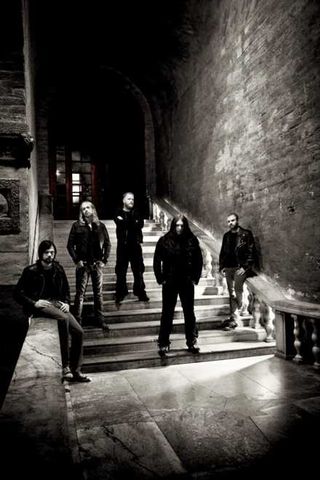
Do you feel this is going to be a challenging album to recreate live?
“Not on the guitar front - that´s going to be covered. But I think we´re going to have to sort out the keyboard parts very, very well. We´re talking about bringing him [Frank Default] in on a live setting - that would sort everything out. But if we don´t do that we need to hook up all the backing tracks for it to represent what we´ve done on this album. In the past we had a little bit of a different approach - what you hear on the album is one thing, but what you´re going to see in the live setting is more rock n´ roll, we´re going to strip it down. At the same time we´ve never used this amount of keyboards before so I think to do the new album justice we have to incorporate a lot more of that. That´s going to be a challenge because we haven´t used click tracks before and we would need that. If we use backing tracks for the keyboards, we´d need click tracks for the drummer. It´s a challenge - we´re still caught up in the Motörhead rock n´ roll setup! “
So Frank isn´t a full member of the band at this stage?
No I wouldn´t say he´s a full member yet. He´s still at the stage where we would turn to him for another collaboration. It´s evaluation time here - if he fits in with the band and everything goes smooth… I mean it´s also about the personal and social aspect of course, as a human being. We´ve had the same line-up for ten years now without any change - that´s a pretty long time. Before that we had changes all over the place, we never found the right people so we´re pretty picky right now that everyone has to fit. You don´t want to bring just anyone into the Katatonia family but we get along with frank very well. He´s a very talented guy and someone we would need at this point in time.”
The limited edition ‘Swedish´ version of the album includes a bonus track called Ashen, but it was interesting to see that you haven´t tagged it on the end; instead it´s before the final track Departer. Why did you decide to do that?
It didn´t sit on the end. We put down a lot of emphasis on the track order of the album to really have a flow going and when they said we needed a Swedish… that´s a stupid word by the way - it´s nothing to do with Sweden or anything, only Swedes can biuy it or whatever - that´s stupid. It´s just a nice word for a limited edition. So they [the label] said we want one bonus song on that one and we said we can´t tag it on the end because the end song is there for a very, very fine reason. So we tried to squeeze it in and that was the best position we could find. But it´s still not ideal for us to have it there, but what can you do!
It´s also going to be on the vinyl as well. The reason this song is not on the normal version is because we didn´t find a good position for it to flow in the record and we also feel that the song is a little bit strange. It´s not a bad song by any means, it´s just a little bit strange. That´s probably the politically correct way of saying it. [laughs]”

You have two Mayones signature guitars now - a Setius and a Regius. How did you end up endorsing the company?
“It goes back to 2005 - they actually contacted me and I was just going through a lot of offers at the time. I hadn´t made up my mind where I wanted to go because I´m a fan of guitars - I´ve got a lot of different models. I was always a fan of the
Gibson SG
, I´d used that one live a lot. The
Les Paul
was always a very reliable guitar when we were in the studio. I also had
Fernandes
guitars because I was a big fan of the sustainer. But Mayones approached me and said, If you want to hook up with us we can make all of that stuff you have now into one guitar for you. I thought, wow - how can I refuse that offer? So I sent them all my preferences, what I liked about the guitars I had and made them put that sustainer pickup from Fernandes into the guitar as well. It is the guitar I´d dream about! They are really reliable - I can use them live and in the studio and I don´t really have an urge to use any other guitars so I´m super pleased with that. It´s very cool for me to have two model ranges. One is the version with the neck-thru, the other is a bolt-on so more budget but still very, very nice guitar to play.”
What are you using with your other band, Bloodbath?
“I´ve got one other one - It´s based on the bolt-on model but it´s equipped with EMGs because I don´t need the sustainer in that. Bloodbath is full on death metal so it should be easy - one cable into the amp and let´s go!”
Do you think having Bloodbath as an outlet for the extreme metal side on your playing has benefited Katatonia?
“Yes it does, definitely - it just cleanses you. Death metal was around for us even before Katatonia was born, we were fans of that music style in our teens so that will always be dear to us. It will always be there in our hearts. I choose to call it [Bloodbath] a vacation from Katatonia because it´s just a pleasure to do it. There´s no real struggle to get there with a new album; the writing comes easy, it just flows out and it´s just fun. It´s fun in the studio, it´s fun on the stage - no compromises, you know? Death metal wakes up the balance here of the whole equilibrium. Musically I have a pretty broad taste so I want to keep all my inner demons fed here. By having Bloodbath on the extreme side and Katatonia on the other side it´s perfect for me.”

Back to Katatonia, there´s some really soulful and subtle lead playing from you on this album - especially Idle Blood and Inheritance…
“That´s nice to hear. I´m not a shredder type of guy, I never really had the interest learn that stuff and go all the way there. I was always more into lead players who didn´t go into full solo [mode] but totally focused on the emotion of each note. That´s really where I´m comfortable and where I want to be.”
You´ve always evolved as a player too - your signature on the earlier albums was harmony lead lines. Can you hear your influence on other bands - such as Daylight Dies, for example?
“I do and it´s also very flattering because they quote me sometimes [as an inspiration]. But in turn I name
Greg Mackintosh
of Paradise Lost - he was the one that really did it for me back in the day. I think his tone stood out from everybody at the time. Then it was about taking that and doing something from it so that it becomes your own tone. I think that has a lot to do with your fingers but also what effects you use. When everything comes together that´s what the output will be. But it´s very flattering that some bands name me as an influence on their guitar playing - that´s wonderful to hear. I don´t really think about my self in those terms at all. I feel that I am the fan!”
Who were your other early inspirations on guitar?
“Before that, one of the biggest reasons for me to pick up the guitar was [KK] Downing and [Glenn] Tipton from Judas Priest. Their whole harmonic duel lead work on their albums was amazing for me and as a kid I was really impressed by the V shaped guitars they had. I´m a big fan of that. And
Wolf Hoffman
from Accept was a big influence for me in the beginning. He still has one of the greatest tones on the guitar that I´ve ever heard - it´s fantastic. I even had to write him an e-mail to ask about it and I was surprised I got a personal answer from him saying exactly what setup he had! Tipton, Downing and Hoffman were the biggest inspirations from me in the early days.”
How would you describe the differences between yourself and Fredrik as guitar players?
“He is the kind of guy who doesn´t play wrong - you very rarely hear him play mistakes. He´s a very reliable guitar player. And when we hear certain kinds of intervals between the notes or riffs we have this thing, we immediately say it´s typical Fredrik. Because, ironically, it always has this little flavour that there´s something wrong in it. Like the time signature is really strange but he´s not really aware of it himself. He´s not doing it consciously. That´s some kind of natural hidden talent with him.
“I would really hope to see him step up a little bit more with the writing because he´s been very passive on that front lately. But he did an album recently with his side project October Tide that we are yet to hear - we haven´t heard it yet.”
Wow, I had no idea there was going to be another October Tide album…
“Jonas [who played on the previous two October Tide albums] isn´t on it. I don´t really know what other guys he used but it´s supposed to be finished. Maybe he´s shopping for a deal with it. It´s going to be interesting to hear it. There´s probably a lot of surprises going on with that one - but at the same time it shows he can write. I would say he should step up and next time give me half a Katatonia album to work on! [laughs]”
This is your last album for Peaceville under your current deal - do you know if you´ll stay on with them?
“I can´t say for sure. Labels are coming from all directions and putting offers under our noses for us to sniff at. It´s a crazy time but it´s exciting here. I think we have a lot of new doors here and we´re on the threshold just looking at the crossroads to decide where we want to go. Luckily we have new management now - Northern Music Andy Farrow [Opeth]. He´s very good at this.”

It´s good to see you touring with bands like Porcupine Tree and Paradise Lost…
“He´s responsible for that - we´re definitely in good hands with that. He´ll know whether we should resign or whether we´re going to move on. I think it´s nice not to have that burden on our own shoulders - at the end of the day who are we? We just want to be the musicians. We don´t want to make all the business decisions because we´ve been doing that for a long time. That was also the reason there was a three year gap between albums. You just get too drained from doing all the business all the time, at a time when you what to be inspired to find the magic to create a new album. But Peaceville have been good lately - everything we did on the last album was great, we got three singles, we got three videos out of it. We got a lot of support and they are very easy to talk to now.”
You must be proud that Katatonia have progressed to the point where you could feasibly tour with a band like The Cure as well as heavy metal bands?
“Yes, for us it´s always important to have an open mind - we always wanted to stick out. We have our roots; we have our foundation in metal and rock but we´re never closing the doors on any other kind of music style. We can go there, grab something we like out of it and incorporate that back into Katatonia. And it´s still going to be Katatonia.
“It´s funny because if some stubborn, narrow-minded guys say, You were great on your first album when you were a death metal band, it´s really funny to say to the guy, You should know about the influences we had on that album. They were totally outside of metal even at that time -
The Cure, Fields Of The Nephilim
, a lot of singer/songwriter material - we just mirrored that into our metal sound. That person wouldn´t have probably had a clue about it. It´s really healthy for us to keep an open mind - we don´t want to stagnate and be these narrow-minded people that have to be metal for the sake of it. Of course we love that sound and that´s where we comfortable being at, but there´s so much more music you´re going to miss out on. There´s so much talent out there that needs to be heard.”
Lastly, can you choose one album that´s had the most effect on you as the guitarist?
"I would say, if I really think about my career as a guitarist and a musician, I would have to say Gothic by Paradise Lost. The guitar work on that album is the reason I went on to form Katatonia and get my tone. "
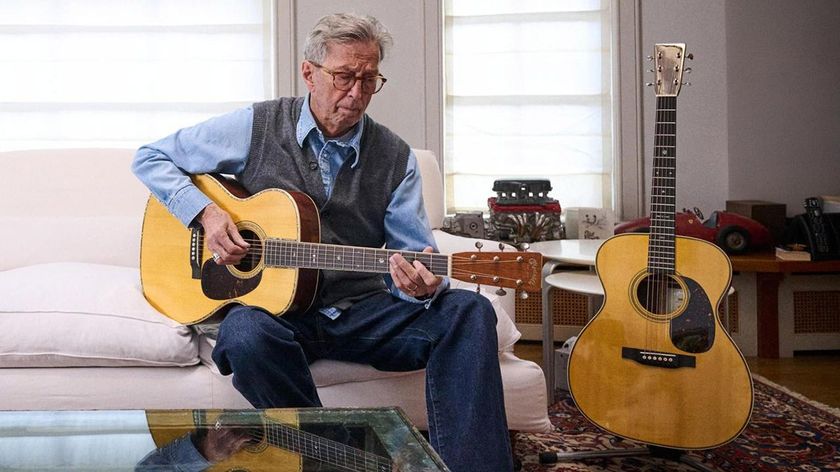
“Over the past three decades, his partnership with Martin has produced some of the most sought-after signature guitars in the company’s history”: Martin recreates Eric Clapton’s MTV Unplugged acoustic for limited edition anniversary run

"I believe I’ve got the last recording Jeff Beck ever did in the studios": Guitarist Mick Rogers thinks he's in possession of a piece of musical history
